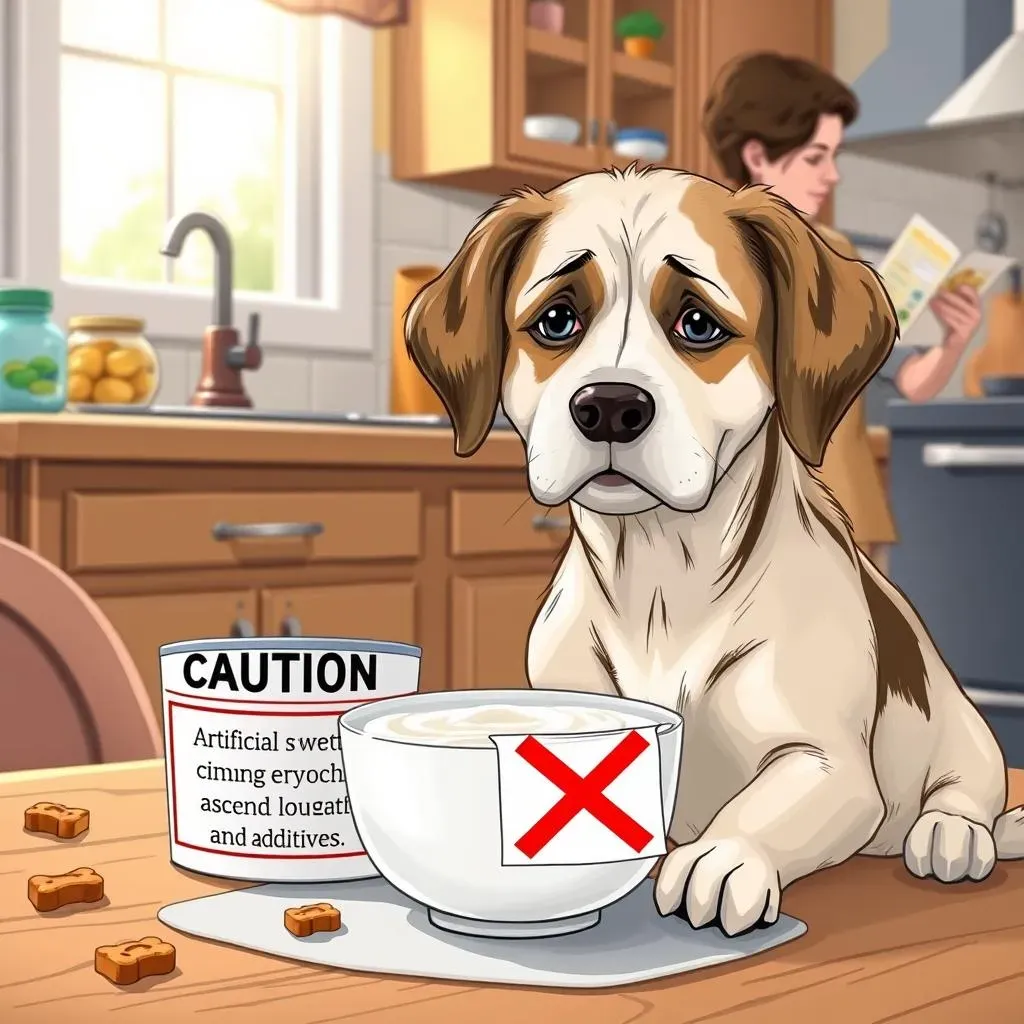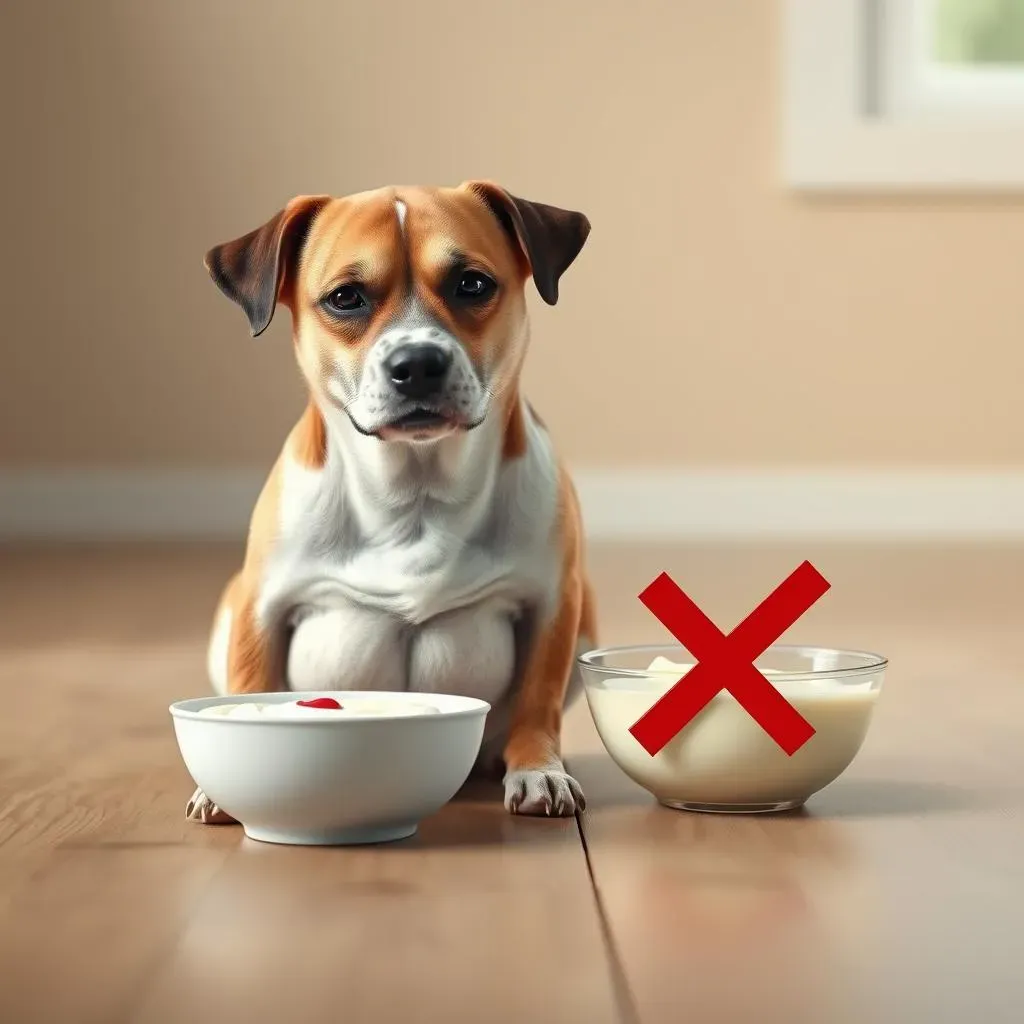Table of Contents
You're standing in the kitchen, spooning out a dollop of low fat yogurt, and your furry friend is giving you those irresistible puppy-dog eyes. The question pops into your head: Can dogs eat low fat yogurt? The short answer is potentially yes, but it's not quite that simple. Yogurt can be a tasty treat and even offer some health benefits for your canine companion, but there are crucial things to consider before you share your snack. This article will guide you through the ins and outs of feeding yogurt to dogs, focusing specifically on low fat varieties. We'll explore the potential benefits, such as probiotics and calcium, but also delve into the risks, including lactose intolerance and harmful additives. Plus, we'll provide practical advice on serving sizes and how to choose the safest, most nutritious yogurt for your beloved pooch. So, grab a spoon (one for you, maybe a tiny one for your dog later), and let's get started!
Is Low Fat Yogurt Safe for Dogs? Decoding the Dairy Dilemma

Is Low Fat Yogurt Safe for Dogs? Decoding the Dairy Dilemma
The Lactose Factor: A Key Consideration
So, you're wondering if you can share that low-fat yogurt with your pup? The big question revolves around lactose. Dogs, unlike humans, often have trouble digesting lactose, the sugar found in milk products. Many adult dogs lack significant amounts of lactase, the enzyme needed to break down lactose. This deficiency can lead to digestive upset, ranging from mild gas to full-blown diarrhea. It's not pretty, for either of you. The level of lactose can vary between different brands and types of yogurt. That’s why it's important to be mindful of the kind of yogurt you give to your dog.
Here's a quick rundown:
- Plain, unsweetened yogurt generally has less lactose than flavored varieties.
- Greek yogurt is often lower in lactose because of the straining process.
- Low-fat yogurt is often seen as the healthier option for dogs because it can help prevent weight gain.
Artificial Sweeteners and Additives: The Real Villains
Lactose isn't the only thing to watch out for. Many commercially available yogurts are loaded with artificial sweeteners, flavors, and other additives that can be harmful to dogs. Xylitol, a common sugar substitute, is extremely toxic to dogs and can cause a rapid drop in blood sugar and even liver failure. Other additives, like artificial colors and preservatives, can also cause allergic reactions or digestive issues in sensitive dogs. Always read the ingredient list carefully. It's better to be safe than sorry when it comes to your dog's health. I've seen dogs get seriously ill from seemingly harmless "human" foods, so vigilance is key.
Here's a table that explains what to look for:
Ingredient | Why It's Bad | Safe Alternative |
|---|---|---|
Xylitol | Extremely toxic; can cause liver failure. | Avoid completely! |
Artificial Sweeteners (e.g., Aspartame, Sucralose) | Can cause digestive upset or allergic reactions. | None recommended. |
Artificial Colors and Flavors | Potential allergens or irritants. | Natural fruit purees in very small amounts. |
The Nutritional Benefits of Yogurt for Dogs: Why It Might Be a Good Treat

The Nutritional Benefits of Yogurt for Dogs: Why It Might Be a Good Treat
Probiotics: Good Bacteria for a Happy Gut
so you've navigated the lactose and sweetener minefield – good job! Now let's talk about why you might want to give your dog yogurt in the first place. The main reason? Probiotics. Yogurt, especially varieties with "live and active cultures," is packed with these beneficial bacteria. Probiotics can work wonders for your dog's digestive system. They help balance the gut flora, which can improve digestion, boost the immune system, and even reduce allergy symptoms. Think of it as a tiny army of good guys fighting off the bad guys in your dog's tummy. And a healthy gut means a happier, healthier pup. Who doesn't want that?
However, it's important to note that not all yogurts are created equal. Look for yogurts that specifically list the strains of bacteria they contain, such as Lactobacillus and Bifidobacterium. These are some of the most well-studied and beneficial probiotics for dogs. Also, be aware that some processing methods can kill off the live cultures, so opt for yogurt that's been minimally processed.
Calcium: Building Strong Bones and Teeth
Beyond probiotics, yogurt is also a good source of calcium. Calcium is essential for maintaining strong bones and teeth, supporting muscle function, and aiding in nerve transmission. This is especially important for growing puppies and senior dogs, who may need extra calcium to support their developing or aging bodies. A little yogurt can be a tasty way to supplement their calcium intake, especially if they're picky eaters or have certain dietary restrictions. Of course, calcium shouldn't be the only reason you feed yogurt. You can find calcium in many other food sources.
Just like with probiotics, not all yogurts are great sources of calcium. The amount of calcium can vary depending on the brand and type of yogurt. Check the nutrition label to see how much calcium it contains and compare it to your dog's daily needs. Remember, moderation is key. Too much calcium can actually be harmful, especially for large-breed puppies, so don't go overboard.
Other Nutrients: Protein and Vitamins
While probiotics and calcium are the main stars, yogurt also contains other beneficial nutrients, such as protein and certain vitamins. Protein is essential for building and repairing tissues, supporting muscle growth, and maintaining a healthy immune system. Vitamins like B12 and potassium are also found in yogurt and play important roles in various bodily functions. These nutrients, while not as abundant as probiotics and calcium, contribute to the overall nutritional value of yogurt and can provide additional health benefits for your dog. Just be mindful of the overall balance of your dog's diet and don't rely solely on yogurt for these nutrients.
To illustrate the differences, here's a breakdown of typical nutrient content in plain, low-fat yogurt (per cup):
Nutrient | Amount (approximate) |
|---|---|
Calcium | 415 mg |
Protein | 12-14 g |
Potassium | 573 mg |
Vitamin B12 | 1.3 mcg |
Potential Risks of Feeding Yogurt to Dogs: Lactose, Sweeteners, and More

Potential Risks of Feeding Yogurt to Dogs: Lactose, Sweeteners, and More
Lactose Intolerance: A Gut-Wrenching Reality
so we've talked about the good stuff in yogurt, but let's get real about the potential downsides. Lactose intolerance is a big one. Just like some humans, many dogs can't properly digest lactose, the sugar found in dairy products. This is because they lack sufficient amounts of lactase, the enzyme responsible for breaking down lactose. When undigested lactose hangs around in the gut, it can cause a whole host of unpleasant symptoms, including gas, bloating, diarrhea, and vomiting. Trust me, you don't want to deal with a dog who's experiencing lactose-induced digestive distress. It's messy, uncomfortable, and can lead to dehydration. So, before you start feeding your dog yogurt, it's important to be aware of the signs of lactose intolerance and to start with small amounts to see how they react.
How do you know if your dog is lactose intolerant? Look out for these telltale signs after they consume dairy:
- Excessive gas or flatulence
- Loose stools or diarrhea
- Vomiting
- Abdominal pain or discomfort (indicated by restlessness, whining, or a hunched posture)
- Loss of appetite
The Sweetener Trap: Xylitol and Other Dangers
Even if your dog tolerates lactose well, you're not out of the woods yet. Many commercially available yogurts are packed with artificial sweeteners, and some of these can be downright dangerous for dogs. Xylitol is the biggest offender. This sugar substitute is extremely toxic to dogs, even in small amounts. It can cause a rapid drop in blood sugar, leading to weakness, seizures, and even liver failure. Other artificial sweeteners, like aspartame and sucralose, aren't as toxic as xylitol, but they can still cause digestive upset and other health problems. And let's not forget about added sugars, which can contribute to weight gain, dental problems, and other issues. When it comes to yogurt, plain and unsweetened is always the safest bet. I always recommend reading the ingredient list carefully before offering any yogurt to my dogs.
Here's a quick guide to sweeteners and their potential risks:
Sweetener | Risk to Dogs |
|---|---|
Xylitol | Highly toxic; can cause liver failure and death |
Aspartame | Potential digestive upset |
Sucralose | Potential digestive upset |
Added Sugars (e.g., sucrose, fructose) | Weight gain, dental problems |
Serving Suggestions: How Much Low Fat Yogurt Can Dogs Eat?

Serving Suggestions: How Much Low Fat Yogurt Can Dogs Eat?
Start Small and Observe
Alright, so you've found a plain, unsweetened, xylitol-free low fat yogurt – excellent! Now, how much should you actually give your dog? The golden rule here is to start small. Think of yogurt as a treat, not a meal replacement. For small dogs (like Chihuahuas or Yorkies), a teaspoon or two is plenty. Medium-sized dogs (Beagles, French Bulldogs) can handle a tablespoon or two. Larger breeds (Labs, German Shepherds) might enjoy a couple of tablespoons. The key is to observe your dog's reaction. Does their tummy seem happy? Are they experiencing any gas, bloating, or diarrhea? If everything seems fine after a day or two, you can gradually increase the amount, but always stay within reasonable limits.
I always tell people to think of it like introducing any new food to your dog. You wouldn't suddenly switch their entire diet overnight, would you? Same principle applies here. Gradual introduction is key to preventing digestive upset and ensuring a positive experience for everyone involved.
Consider the Frequency
you know how much yogurt to give your dog at one time, but how often is too often? Generally, yogurt should be an occasional treat, not a daily staple. Once or twice a week is usually sufficient to provide the probiotic and calcium benefits without overloading their system. If you're using yogurt to help with a specific digestive issue (like after a course of antibiotics), you might give it more frequently for a short period, but always consult with your vet first. They can provide personalized recommendations based on your dog's individual needs and health condition. Remember, every dog is different, and what works for one might not work for another. Pay attention to your dog's cues and adjust accordingly.
To help you visualize appropriate serving sizes, here's a handy guide:
Dog Size | Recommended Serving Size | Frequency |
|---|---|---|
Small (under 20 lbs) | 1-2 teaspoons | 1-2 times per week |
Medium (20-50 lbs) | 1-2 tablespoons | 1-2 times per week |
Large (over 50 lbs) | 2-3 tablespoons | 1-2 times per week |
Creative Serving Ideas
Want to make yogurt time even more exciting for your pup? Get creative with your serving methods! You can mix yogurt with their regular food, stuff it into a Kong toy and freeze it for a long-lasting treat, or even spread it on a lick mat for some mental stimulation. Just be sure to adjust their regular food portion to account for the extra calories from the yogurt. Another fun idea is to make frozen yogurt "pupsicles" by blending yogurt with dog-friendly fruits like blueberries or bananas and freezing them in small molds. These are especially refreshing on a hot day. The possibilities are endless, so have fun experimenting and finding what your dog loves best!
Just remember to avoid adding any extra sweeteners or artificial ingredients. Keep it simple, keep it healthy, and keep it delicious for your furry friend!
The Final Scoop: Low Fat Yogurt for Dogs – A Treat with Caveats
So, can dogs eat low fat yogurt? The answer, as we've explored, is a conditional yes. Plain, unsweetened, low fat yogurt can offer some nutritional perks for your furry pal, providing probiotics and calcium. However, it's essential to be mindful of potential risks like lactose intolerance, artificial sweeteners (especially xylitol, which is toxic to dogs), and other additives. Always check the label carefully, introduce yogurt slowly into your dog's diet, and consult with your veterinarian if you have any concerns. When in doubt, a small spoonful of plain, low fat yogurt can be a healthy and delicious treat for your canine companion – just remember moderation and informed choices are key to keeping their tails wagging!
